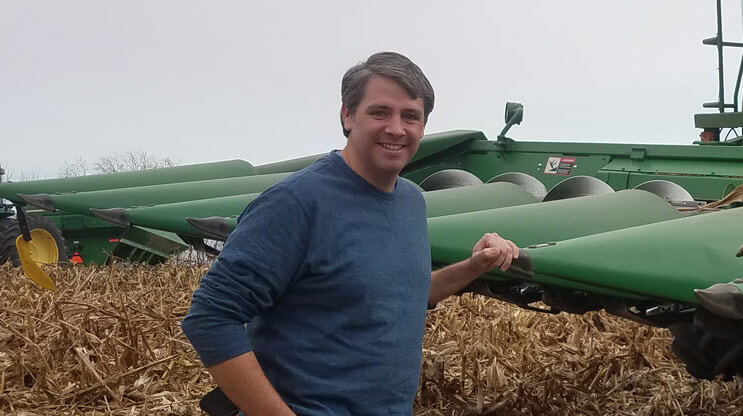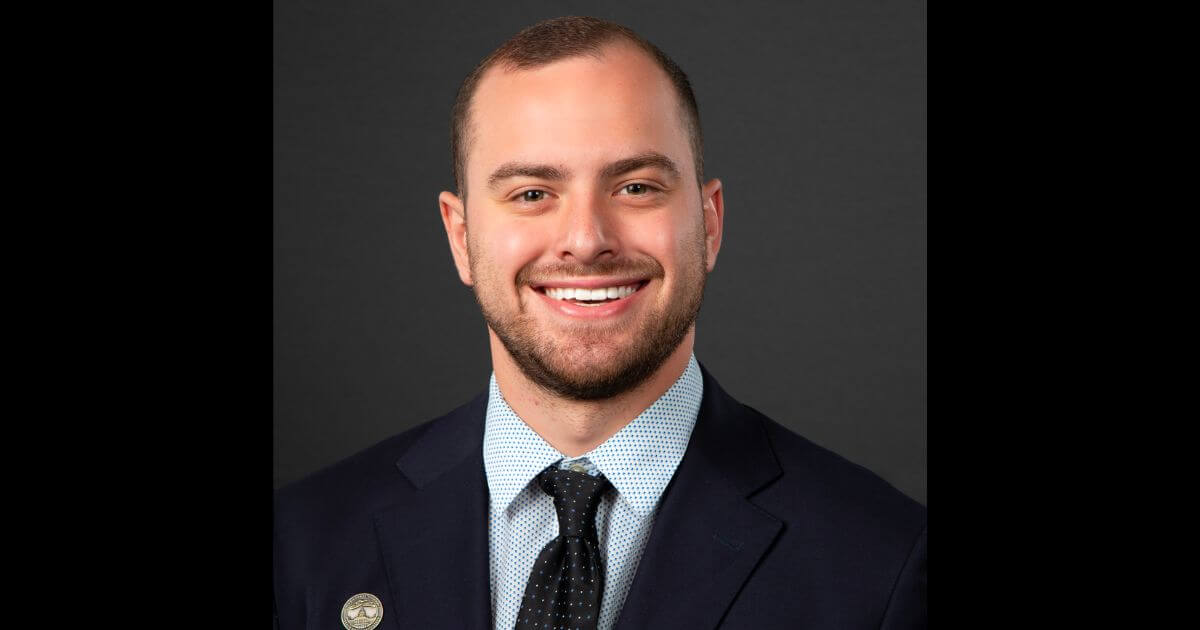
Democrats will have a strong contender for the secretary of agriculture race this year: Tim Gannon, a former USDA staffer who farms on his parent’s Century Farm in Mingo. He announced his run for the office today, and should bring considerable policy knowledge and a helpful political network to the race.
It’s still unclear what exactly is going to happen with current Secretary of Agriculture Bill Northey’s appointment to the USDA with Senator Ted Cruz still blocking the move. Several Republicans have announced their intention to run in 2018, and more may soon join.
Gannon is likely to be the only candidate on the Democratic side, if for no other reason because it’s getting close to the filing deadline and it takes a couple weeks to collect enough statewide signatures.
If Gannon is ultimately successful, he’ll follow his father’s footsteps into elected office. His father, Bill Gannon, served in the Iowa House several decades ago, and still runs the family farm in Mingo.
That small Jasper County town of about 300 people is where Gannon grew up and lived through the farm crisis of the 1980s. Friends and neighbors went out of business and many moved out during that time. Gannon went from a being a student in a class of 12 kids in 2nd grade to a class of 60 in 3rd grade when Mingo schools had to consolidate with Colfax.
“The population loss that occurred in the 80’s has slowed, but we haven’t done enough to bring it to a halt or replace people who moved away,” Gannon told Starting Line in an interview earlier this week.
Gannon attended plenty of political events while young, watching Iowa Caucuses up close with a politically-engaged family. He later attended the University of Iowa, where he was a senior during Tom Vilsack’s first run for governor. Gannon was considering leaving the state for other jobs after graduation, but Vilsack urged him to reconsider.
“He looked at me the way Tom Vilsack looks at people and said, ‘We really need people like you to stick around.’ That’s kind of a powerful thing to land on a 21-year-old,” Gannon said.
After that conversation, Gannon got more involved in volunteering on Vilsack’s campaign. He ran state legislative races after college, heading up the House Democrats’ campaign committee in the 2002 and 2004 cycle. Rural outreach was his job on Barack Obama’s 2008 campaign in Iowa, where he found success in bringing rural voters back to the party.
“We helped flip some counties that went for Bush in 04,” he said. “You don’t have to win in Lyon and Sioux County, but you’ve got to up and talk to folks, let them know how you want to make their lives better.”
Gannon would follow Vilsack into the USDA, at first working on rural business development funds and guaranteed loans through the Recovery Act. He had been interested in college in agriculture and small town development research, but it became particularly personal to him around 2006 and 2007.
“Coming from Mingo, a lot of people I knew, a lot of parents of my friends, either worked at or had worked at Maytag,” Gannon said of the major factory that shuttered in 2007. “A lot of folks were graduating from high school in Jasper County on Sunday and started working at Maytag on Monday … I knew I wanted to work in rural economic development.”
After nine months at the USDA, Gannon moved to Vilsack’s office for five years, where he set up travel for the secretary and worked with the communications shop. He closed out his last two years with the department as an assistant administrator in the risk management agency, which oversees crop insurance.
“I was very involved in developing new policies to help farmers manage their risk better – not just corn, wheat farmers who traditionally use insurance, but a lot of specialty crops too,” Gannon said.
That included working to make the system better for lots of organic producers, direct-to-source farmers and farms that grew dozens of separate kinds of crops.
After Obama’s second term came to an end, they were ready to return home.
“My wife and I made our decision to move back to Iowa long before the [2016] election,” Gannon said. “We had done our time in the administration, decided it’s probably time to leave D.C. if we’re going to have a family.”
After returning to Iowa and buying a house in Des Moines, Gannon went to work back on the family farm in Mingo. He and his wife, Liz, had a baby daughter, Lucy, this December.
“As I talk about the future of agriculture and Iowa, I see her as part of that,” he noted. “No idea if she’ll be interested in farming one day, but I hope she is and becomes the next generation of Gannons to call themselves Iowa farmer.”
That’s part of what drew Gannon’s interest in running for the secretary of agriculture job – finding ways for Iowa to build an environment where the next generation of farmers can get started and take over. He pointed to specific concerns about student debt for recent graduates of Iowa and Iowa State. Many times, those students would like to move back home and help out on the farm or start working their own, but it’s not as profitable right away. Large agribusinesses often hire them up into sales or a leadership track, moving them around to different towns every few years, helping them pay off their debt in the process.
Gannon gave Northey high marks on his handling of the avian flu outbreak in 2015, but added that Northey and other Republicans didn’t do nearly enough on addressing Iowa’s water problems.
“We could be providing more leadership on water quality,” he said. “The state has a nutrient reduction strategy, but I think it needs some benchmarks … Every Iowa taxpayer deserves to know if that money being spent is having an impact and leading to results we want. Iowans in 2010, at the same time they elected Governor Branstad and swept Democrats out … that same electorate voted well over 50% for the 3/8 cents sales tax to go toward water efforts. The fact that the Legislature hasn’t taken action on what voters wanted is something we need to look at.”
Part of doing that involves actually investing in research projects at Iowa universities.
“It may not be the secretary of agriculture’s job to propose a budget for the Regents universities, but I think we’ve got to be talking about spending more money on research, especially at Iowa State,” he said. “Last session, there was a lot of talk about the Leopold Center. That was one part of it. We’ve kind of allowed the chemical and seed company to take over a lot of research … They come up with products that a lot of farmers want to use, but their products are based on what’s best for their bottom line, not what’s best for farmer’s bottom line.”
A big part of the job will obviously focus on Iowa’s main crops of corn and soybeans. On that front, Gannon wants to find new ways to get farmer’s products to markets and work on the next uses for corn. He noted there’s other ways corn could get sold for use in making plastics or starch.
“Ethanol is always going to be important for corn, but we’re growing more and more on roughly the same amount of land so we have to find out new uses,” Gannon said. “Either we’ve got to figure out new uses for the things we grow or we’ve got to figure out some other rotation of crops that’s going to allow new strings of income without decimating the price of corn or beans.”
Finally, he noted that a more comprehensive approach to rural Iowa and small towns needs to be done to keep young people around and build up the local economy. Many of those measures help farmers as well, including expanding rural broadband, which can help the developing field of precision agriculture.
“One of the reasons we need to improve broadband coverage in rural Iowa is so this technology can reach its maximum potential,” he explained. “High-speed broadband is important to the entire economy, but for some of the GPS guided tractors and precision agriculture technology to work at its best, that rural coverage for broadband is very important.”
Democrats haven’t held the secretary of agriculture office since Patty Judge left it in 2007, and the party has come up particularly short in the past two campaigns. A competitive Republican primary should cost a lot of money, while Gannon can simply raise funds now for the general election. For Democrats to win back some voters in rural Iowa, they’ll need a credible candidate like Gannon who can authentically talk with farmers and small communities about their issues.
Gannon’s website is here, his Facebook page is here and his Twitter handle is here.
by Pat Rynard
Posted 2/1/18

Lanon Baccam wins 3rd District Dem primary, will face Zach Nunn
Baccam defeats Melissa Vine to challenge Republican incumbent Lanon Baccam defeated Melissa Vine in Tuesday’s Democratic primary for Iowa’s 3rd...

Hardin County man running for office as Trump-loving Democrat to local party’s dismay
Brad Rewoldt, who recently changed his party affiliation from Republican, says his support of Trump will probably 'piss off' Democrats There is a...

Scheetz: Tax cuts for all Iowans, not just the wealthy
State Rep. Sami Scheetz says all Iowans should benefit from tax cuts via a sales tax reduction As a state representative, my job is to serve the...

Kalbach: What Iowa Republicans focused on during legislative session
Our state legislative session finished up towards the end of April, and I’m glad it’s over! From further de-funding and privatizing our public...

Advocates file suit to stop Iowa’s ‘unconstitutional’ immigration law
Immigration advocates filed a federal lawsuit Thursday to stop Iowa’s new immigration law—SF 2340—from taking effect arguing that the legislation...

Iowa Republicans make outlawing gay marriage key 2024 campaign priority
Iowa Republicans have made outlawing gay marriage a key goal in their 2024 party platform. During the Iowa GOP’s 2024 state convention on Saturday,...





